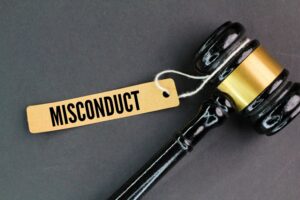What If I’m Partly to Blame for My Work Injury?

You’ve worked hard, day in and day out, ensuring you perform your duties with care and attention. But one moment of distraction or a simple misstep can lead to a serious injury on the job.
Whether it was due to carelessness, distraction, or a misjudgment on your end, don’t worry–in Indiana, even if you believe you’re partly to blame for your work injury, you still likely qualify for workers’ compensation benefits.
In this guide, we’ll explore what happens if you’re partly to blame for your work injury and how Indiana law ensures you still have access to the benefits you need.
Remember, when facing complex legal issues surrounding a work injury, always consult an experienced workplace accident attorney who can offer tailored advice to your unique situation and guide you through the process.
Call Klezmer Maudlin today at (317) 569-9644 to discuss your case and secure the compensation you deserve.
Schedule a Free Initial Consultation Today!
Indiana’s No-Fault Workers’ Compensation: How It Works

Under Indiana Code § 22-3-2-2, the state operates a no-fault workers’ compensation system. This means that when you suffer injuries on the job, you qualify for compensation benefits regardless of who caused the injury—whether it was your employer, a coworker, or even yourself.
This no-fault system helps workers receive the medical care and wage replacement they need without needing to prove someone else caused the accident.
For many, this is a relief. Imagine the stress of having to fight for benefits while also recovering from an injury. Indiana’s system removes that burden, focusing on getting you back on your feet as soon as possible.
Exclusivity Rule
There’s another important aspect of Indiana’s workers’ compensation system that you need to understand: the exclusivity rule. This rule, codified under Indiana Code § 22-3-2-6, bars employees from suing their employers for workplace injuries.
In other words, when you’re injured at work, the law limits your remedy to the benefits provided under the workers’ compensation system. You can’t take your employer to court for additional damages, even if their negligence contributed to your injury.
The trade-off in this exclusivity rule provides quick and certain benefits through workers’ compensation while shielding employers from potentially costly lawsuits.
Why does this matter? This rule ensures that Indiana’s workers’ compensation system remains the primary—and often the only—avenue for injured workers to receive compensation. The no-fault and exclusivity provisions together create a system where injured employees can focus on healing rather than on lengthy and uncertain legal battles.
Potential Exceptions
There are rare exceptions where fault could affect workers’ compensation. For example, if the injury was intentionally self-inflicted or occurred while you were intoxicated, you will likely face challenges in receiving benefits.
Practical Tips for Workers Partly at Fault
If you contributed to your work injury, take proactive steps to protect your rights and recover the workers’ compensation benefits you deserve.
Here are some practical tips to help you navigate this situation:
1. Report the Injury Immediately
- Why It Matters: The first step is to report your injury to your employer. Indiana law requires that you report any injury within 30 days (Indiana Code § 22-3-3-1). Failing to do so could jeopardize your claim, as timely reporting helps establish that the injury occurred in the course of employment, regardless of fault.
- What to Do: Notify your supervisor or HR department as soon as the injury occurs. Provide a clear, accurate account of what happened, and avoid downplaying your injury.
2. Seek Immediate Medical Attention

- Why It Matters: Getting medical care right away not only ensures you prioritize your health but also creates a medical record that documents your injury. This record will play a part in supporting your workers’ compensation claim.
- What to Do: Visit an authorized medical provider as directed by your employer. Be honest with your doctor about how the injury occurred, and follow all recommended treatments and follow-up appointments.
3. Document Everything
- Why It Matters: Comprehensive documentation will help protect your claim. Detailed records provide evidence that can clarify the circumstances of your injury and support your case if there’s any dispute.
- What to Do: Keep copies of all reports, medical records, and correspondence related to your injury. Take notes on conversations with your employer, doctor, or insurance representatives, including dates and key points discussed. If possible, gather witness statements from coworkers who saw the incident.
4. Understand Your Rights Under Indiana Law
- Why It Matters: Knowledge is power, especially when dealing with workers’ compensation claims. Understanding your rights will help prevent any other party from violating them, especially in cases of employer retaliation (more on this below).
- What to Do: Familiarize yourself with Indiana’s workers’ compensation laws, especially the no-fault principle and the exclusivity rule. You have the right to receive benefits regardless of fault, and you cannot sue your employer outside of the workers’ compensation system for your injury.
5. Be Cautious During Employer Investigations
- Why It Matters: Your employer may investigate the cause after an injury. While these investigations are routine, be very careful about anything you say. Sometimes, opposing parties will use statements you made to question the legitimacy of your claim.
- What to Do: Stick to the facts when discussing your injury. Even though fault shouldn’t matter in workers’ compensation claims, avoid speculating about fault or blame during the investigation. If you’re unsure about answering certain questions, consult with a workers’ compensation attorney before providing detailed statements.
6. Consult with a Workers’ Compensation Attorney
- Why It Matters: Navigating the workers’ compensation process can be complex, particularly if fault is in question. It’s easy to make the wrong move without fully understanding the law. This could, at best, deprive you of compensation or, at worst, lead to serious consequences.
- What to Do: Contact our team at Klezmer Maudlin as soon as possible. We will guide you through the process, help you avoid common mistakes, and represent your interests if any disputes arise.
Protecting Yourself Against Employer Retaliation

When you file a workers’ compensation claim, especially when you believe you might be partly at fault, a common concern is the fear of retaliation from your employer. Fortunately, Indiana law provides robust protections against such actions, allowing you to pursue your rightful benefits without fear of unfair treatment.
1. Understanding Retaliation Protections
- Legal Safeguards: Under Indiana Code § 22-3-2-15, an employer cannot retaliate against an employee for filing a workers’ compensation claim. This protection allows injured workers to seek the benefits they deserve without risking their employment status or suffering other negative consequences.
- What This Means for You: Any negative actions from your employer after filing a claim—a reduction in hours, being passed over for promotions, or even termination—could constitute illegal retaliatory actions. Indiana law empowers you to take legal action against your employer in such cases.
2. Recognizing Signs of Retaliation
- Subtle vs. Overt Retaliation: Retaliation isn’t always obvious. Sometimes, it is subtle, like receiving unjustified poor performance reviews or being reassigned to less desirable duties. Other times, an employer might more directly retaliate against you through an immediate reduction in pay or job termination following your claim.
- Stay Vigilant: Keep detailed records of any changes in your work situation after filing a workers’ compensation claim. You need the documentation to prove retaliation later.
3. Taking Action if You Face Retaliation
- Document Everything: As soon as you suspect retaliation, start documenting everything—dates, times, conversations, and actions. The more detailed your records, the stronger your case if you need to file a complaint or a lawsuit.
- Seek Legal Advice: Consult our legal team immediately if you face retaliation. Our team has dealt with countless retaliation cases and knows how to spot the tell-tale signs when they are subtle, and we are prepared to take appropriate legal action to protect your interests.
- Filing a Retaliation Claim: If your employer retaliates against you, Indiana law allows you to file a separate retaliation claim. This claim can result in additional compensation for the wrongs done to you, including reinstatement to your job, back pay, and damages for emotional distress.
4. Protecting Yourself Proactively
- Know Your Rights: Hire a lawyer to educate you about Indiana’s workers’ compensation laws. Understanding the legal protections available to you will empower you to act confidently if you face retaliation.
- Communicate Professionally: If you believe your employer is retaliating against you, maintain professional communication. Avoid direct confrontation with any responsible party, and instead focus on resolving the situation through appropriate legal channels.
Situations Where Fault Does Matter
While Indiana’s workers’ compensation system typically does not concern itself with fault, there are specific situations where fault becomes a factor—particularly when third parties are involved.
Third-Party Liability: When Someone Other Than Your Employer is at Fault
In some work-related injuries, a third party—someone other than your employer or a co-worker—may bear responsibility for the accident. This could include contractors, manufacturers of faulty equipment, or even property owners.
In such cases, Indiana law allows injured workers to file a third-party liability claim against the negligent party. This is separate from your workers’ compensation claim and can provide additional compensation for damages not covered by workers’ compensation, such as pain and suffering.
Imagine you’re working on a construction site and suffer injuries due to a faulty piece of machinery.
While your workers’ compensation claim would cover your medical bills and lost wages, you might also sue the manufacturer of the defective equipment for their negligence under Indiana’s product liability laws (Indiana Code § 34-20-1-1).
Comparative Fault in Third-Party Claims
Indiana follows a comparative fault rule. Under this system, if you pursue a third-party liability claim, a percentage of fault may fall on all involved parties—including you. This percentage directly affects the amount of compensation you can receive.
If you are more than 50% at fault, you cannot recover any damages in a third-party claim.
Employer Negligence and Intentional Misconduct

While the exclusivity rule generally prevents you from suing your employer, exceptions may apply in intentional misconduct cases.
If your employer intentionally caused your injury—such as through assault or knowingly exposing you to hazardous conditions without proper protection—you may have grounds to file a lawsuit outside the workers’ compensation system. However, these cases are rare and challenging to prove under Indiana law.
The situation becomes more complex if your injury stems from a co-worker’s negligence. Generally, workers’ compensation will cover such injuries, but in rare circumstances, you may have grounds to file a claim against the co-worker directly, especially if their actions were particularly egregious.
Dual Capacity Doctrine
Another situation where fault might matter involves the dual capacity doctrine. This legal concept applies when your employer acts in a capacity other than as an employer—such as a manufacturer of a product that injures you.
If a product injures you, and it is one that your employer manufactures and sells to the public, you might sue them as a manufacturer rather than as your employer. However, Indiana courts have cautiously applied this doctrine in highly fact-specific cases.
Protect Your Rights and the Compensation You Deserve
The Worker’s Compensation system in Indiana makes claims daunting, especially if you don’t know about your eligibility, suspect the involvement of a third-party, or face retaliation from your employer.
Remember, the law is on your side, and you don’t have to face these challenges alone.
No matter what situation you find yourself in, our workers compensation lawyers at Klezmer Maudlin is here to support you every step of the way. Contact us today at (317) 569-9644 to discuss your case and safeguard your rights.

